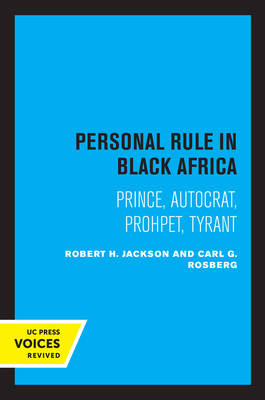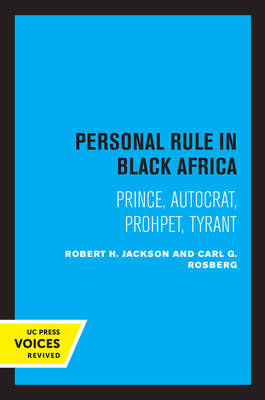
Bedankt voor het vertrouwen het afgelopen jaar! Om jou te bedanken bieden we GRATIS verzending (in België) aan op alles gedurende de hele maand januari.
- Afhalen na 1 uur in een winkel met voorraad
- In januari gratis thuislevering in België
- Ruim aanbod met 7 miljoen producten
Bedankt voor het vertrouwen het afgelopen jaar! Om jou te bedanken bieden we GRATIS verzending (in België) aan op alles gedurende de hele maand januari.
- Afhalen na 1 uur in een winkel met voorraad
- In januari gratis thuislevering in België
- Ruim aanbod met 7 miljoen producten
Zoeken
Personal Rule in Black Africa
Prince, Autocrat, Prophet, Tyrant
Robert H Jackson, Carl G Rosberg
Paperback | Engels
€ 84,95
+ 169 punten
Uitvoering
Omschrijving
Personal Rule in Black Africa: The Dynamics and Challenges of Institutionless Governance offers an in-depth exploration of governance systems across Black African states, focusing on the pervasive model of personal rule. This study contends that political authority in much of Black Africa operates outside the frameworks of institutionalized governance, relying instead on personal influence, informal agreements, and factional power dynamics. Such systems are marked by a distinct absence of enforceable rules, leading to heightened political risks and instability, yet also fostering a form of political order that defies classical theories predicting chaos in the absence of institutionalized systems. The book delves into the historical and sociopolitical underpinnings of personal rule, comparing it to similar transitional governance systems in early modern Europe. It emphasizes the role of rulers' political acumen and adaptability in maintaining order in the face of limited institutional support. Through a typological approach, the study categorizes various forms of personal rule and evaluates their implications for political stability, governance quality, and the provision of essential "political goods" such as peace and security. With insights drawn from classical political theory, sociological frameworks, and comparative politics, the book sheds light on the successes and limitations of this governance model, offering a nuanced perspective on African statecraft and its future trajectory. This title is part of UC Press's Voices Revived program, which commemorates University of California Press's mission to seek out and cultivate the brightest minds and give them voice, reach, and impact. Drawing on a backlist dating to 1893, Voices Revived makes high-quality, peer-reviewed scholarship accessible once again using print-on-demand technology. This title was originally published in 1982.
Specificaties
Betrokkenen
- Auteur(s):
- Uitgeverij:
Inhoud
- Aantal bladzijden:
- 328
- Taal:
- Engels
Eigenschappen
- Productcode (EAN):
- 9780520308565
- Verschijningsdatum:
- 13/05/2022
- Uitvoering:
- Paperback
- Formaat:
- Trade paperback (VS)
- Afmetingen:
- 152 mm x 229 mm
- Gewicht:
- 485 g

Alleen bij Standaard Boekhandel
+ 169 punten op je klantenkaart van Standaard Boekhandel
Beoordelingen
We publiceren alleen reviews die voldoen aan de voorwaarden voor reviews. Bekijk onze voorwaarden voor reviews.









